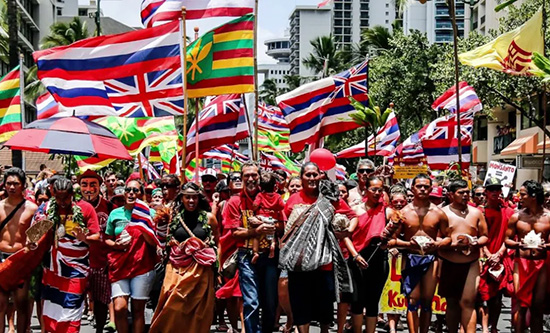
Hawaiʻi has a rich history largely unknown to most of the world. Prior to Western contact, Hawaiʻians lived in a highly organised, self-sufficient, subsistent social system based on communal land tenure. The first documented Europeans to visit were the British in 1778. The Hawaiʻians finally united as a single kingdom in 1810. By threat of war, the French forced the recognition of Catholicism in 1838. US missionary influence become openly political and eventually led to a written constitution in 1840.
After a land dispute involving the British Consul, in February 1843 a British naval officer, Captain Lord George Paulet, occupied the island. The US, Britain and France acceded to recognising Hawaiʻi as a nation state in November that year thanks to the work of Hawaiʻian emissary Timoteo Haʻalilio, who died on his return trip home.* Following this episode, Hawai‘i’s King Kamehameha III enacted a process of transition from communal land tenure to private ownership in an attempt to preserve Hawaiʻian control over our nation’s lands.
Hawaiʻi developed some of the world’s oldest universal social services such as universal healthcare, education, housing, and public transportation. In 1887, then-King Kalākaua was forced to sign the Constitution, known as the Bayonet Constitution, drafted by US businessmen and lawyers, stripping the King of much of his authority. In 1893 Hawaiʻi was finally seized by the US in collusion with settler compradors. The Hawai‘ian government was overthrown and Hawai‘i has been illegally occupied since the so-called ‘annexation’ of 1898. However, because no treaty of annexation was signed, due to the successful organising efforts of the indigenous Hawaiʻian people, the US instead arrogantly passed a joint resolution in its Congress, essentially a domestic law with shameless extraterritorial claims.
Neither the historical nuance and complexities of colonialism and imperialism nor their devastating effects on Hawaiʻi, her lands, waters and people can be denied. The native and working class peoples of Hawaiʻi have continued to resist the hegemony of capital to this very day: from labour struggles in the Plantation/Territorial era, land struggles such as Kalama Valley and Waiahole-Waikāne during what is referred to as the ‘Second Hawaiʻian Renaissance’ of the 1970s, against militarised desecration of our sacred lands such as Naval bombing of the island of Kahoʻolawe and Army live-fire training at Makua Valley and Pōhakuloa, to the movement against astronomy development at the summit of Mauna Kea, specifically the Thirty Metre Telescope. Among several efforts by the Hawaiʻian people to assert our national sovereignty and strive for self-determination and national liberation is the creation of the Nation of Hawaiʻi.
The Nation of Hawaiʻi was promulgated on 16 January 1995 by the Hawaiʻi Constitution. In 1995, Pu’uhonua DKB Kanahele was elected as Head of State, and remains in office today. The Constitution reaffirmed the ‘right to self-determination as a people’ and ‘restoration of political, economic, social and cultural rights’. The formation of the Nation of Hawaiʻi followed the passing of US Public Law 103-150, also known as the Apology Resolution, signed by the United States Congress in 1993 recognising that ‘the illegal overthrow of the Kingdom of Hawaiʻi on January 17, 1893… resulted in the suppression of the inherent sovereignty of the Native Hawaiʻian people… and the deprivation of the rights of native Hawaiʻians to self-determination.’ The Nation of Hawaiʻi’s mission is to restore and maintain the sophisticated religion, language and culture of the native Hawaiʻian people.
We are continuing the fight to decolonise and de-occupy Hawaiʻi through various avenues politically, economically, diplomatically and culturally. We are inspired by the theoretical and practical revolutionary wisdom of our ancestors, our elders, our comrades and the revolutionary leaders worldwide who strive for freedom from the exploitation of man by man, as well as the exploitation of nature by man. We strive to remove the dictatorship of capital across our country and to restore our progressive system of governance. We strive to put the planet and the masses of indigenous and working-class people before profit, contribute to international solidarity and add to the revolutionary anti-colonial, communist, and progressive movements worldwide.
Please visit our website for more information: www.nationofHawaiʻi.org. We ask that you help spread awareness and educate others on Hawaiʻi’s true status as an occupied country fighting for our right to self-determination, demilitarisation, decolonisation, and de-occupation.
John Kealoha Garcia, Foreign Minister of International Relations, Nation of Hawaiʻi
Limahana, Executive Advisor
Wilikoki Ula, Executive Advisor
* The preceding sentence is changed from the print version of this article, at the request of a correction from the Nation of Hawaiʻi.
FIGHT RACISM! FIGHT IMPERIALISM! 296 October/November 2023




